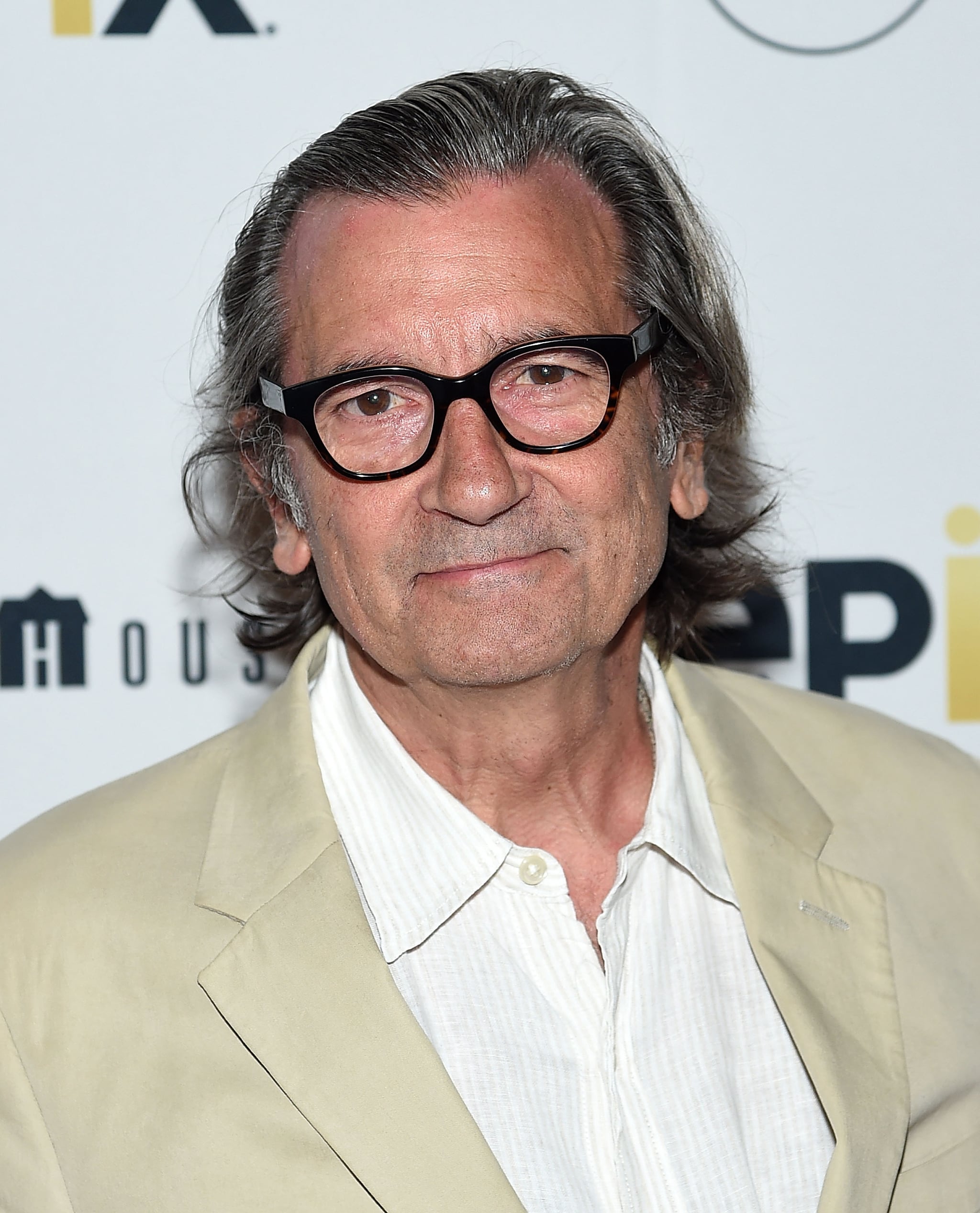Griffin Dunne: Hollywood Tales & Memoir Secrets Revealed
What does it mean to be born into the heart of Hollywood, surrounded by stardust and storytellers, yet still navigate the tumultuous currents of life? For Griffin Dunne, the answer lies within the pages of his new memoir, a journey through privilege, tragedy, and the enduring power of family.
Griffin Dunne, a name synonymous with American cinema, has long been a fixture in the industry, both in front of and behind the camera. His roles in iconic films like "An American Werewolf in London" and "After Hours" have cemented his place in film history, while his directorial and producing ventures have showcased a multifaceted talent. However, beyond the accolades and the bright lights, lies a narrative interwoven with the threads of family, loss, and the ever-present influence of Hollywood's glittering facade. He is, after all, the nephew of the esteemed writers Joan Didion and John Gregory Dunne, and the son of the producer Dominick Dunne.
Dunne's journey, though often touched by the glamorous brushstrokes of Hollywood, has been far from a fairytale. His life has been marked by both profound joy and the shadows of tragedy, experiences he bravely recounts in his memoir, "The Friday Afternoon Club." The book offers a candid glimpse into his upbringing, his relationships, and the indelible mark left by the events that have shaped his life. The memoir has quickly become a New York Times bestseller, lauded for its warmth, perceptiveness, and Dunne's innate ability to weave a captivating story. The tales recounted in the book go from the hilarious to the heart-wrenching, showcasing his gift for storytelling.
- Maddox Joliepitt The Untold Story First They Killed My Father
- Sloan Bella Celebrity Psychic Medium Astrologer Explore Now
| Full Name: | Thomas Griffin Dunne |
| Born: | June 8, 1955 (Age 68) |
| Birthplace: | New York City, New York, U.S. |
| Occupation: | Actor, Film Director, Producer |
| Known For: | "An American Werewolf in London," "After Hours," "This Is Us" |
| Notable Relatives: | Joan Didion (Aunt), John Gregory Dunne (Uncle), Dominique Dunne (Cousin), Dominick Dunne (Father) |
| Memoir: | "The Friday Afternoon Club" |
| Website Reference: | IMDB - Griffin Dunne |
Born into the rarefied air of Hollywood royalty, Dunne's early life was a blend of privilege and proximity to some of the most celebrated figures in the entertainment industry. Beverly Hills was his playground, and his father, Dominick Dunne, a successful producer, hosted a constellation of stars, including Billy Wilder and Sean Connery. Stories of his childhood include sneaking into his parents' dinner parties, rubbing shoulders with icons such as Grace Kelly and Frank Sinatra. It was a world where the extraordinary was commonplace, and the boundaries between the personal and professional were often blurred.
But behind the glitz and glamour, Dunne's life has also been marked by profound loss. He doesn't shy away from recounting the difficult and devastating events that have shaped his family. The impact of tragedy on the Dunne family is an unavoidable fact of their story, and it provides both the foundation and the framework of the new memoir. Dunne's ability to find the balance between humor and tragedy makes the stories more compelling.
In "The Friday Afternoon Club," Dunne delves into the formative years, painting a vivid picture of a family deeply connected to the world of storytelling. He reveals that he never actually planned on pursuing acting; he was initially drawn to journalism, influenced by his aunt and uncle. But fate, as it often does, had other plans. His path eventually led him to a career in front of the camera, where he has left an enduring mark.
One of the most captivating aspects of Dunne's memoir is the intimate look into his personal encounters, including the life-saving act by Sean Connery and his unexpected relationship with Carrie Fisher. These encounters, though seemingly random, reveal the interconnected nature of Hollywood's ecosystem and add layers to Dunne's personal narrative.
Dunne's filmography reflects a diverse range of roles and projects. From his memorable performance as Paul Hackett in Martin Scorsese's "After Hours" to his roles in "Who's That Girl" and "My Girl," Dunne has consistently delivered compelling performances. His more recent work includes appearing in the Max series, "The Girls on the Bus," where he portrayed a character inspired by David Carr.
Dunne's contributions to the world of cinema go beyond his acting credits. As a director and producer, he has demonstrated a keen understanding of the filmmaking process. His versatility and ability to adapt to different roles and creative landscapes have made him a respected figure in the industry.
The book's title, "The Friday Afternoon Club," hints at the gathering of the Dunnes' close relatives and friends, offering a sense of warmth and belonging. The memoir's opening chapters reveal a chilling account of a detective delivering devastating news to his mother at 3 a.m., an event that underscores the tragedy that would reshape his family. Throughout the book, Dunne is not afraid to explore the challenging aspects of life, the pain, and the triumphs.
Griffin Dunne's memoir arrives at a time when the public's interest in Hollywood stories is stronger than ever. The book's success is a testament to Dunne's storytelling skills and his ability to connect with readers. "The Friday Afternoon Club" is more than just a celebrity memoir; it's a meditation on family, loss, and the enduring human spirit, all wrapped in the glittering tapestry of Hollywood's past.
His ability to weave humor with harrowing events in his family's history showcases a unique perspective, one that blends resilience and wit in the face of adversity. The memoir has been lauded for its perceptiveness and warmth, cementing Dunne's reputation as a master storyteller. In essence, Griffin Dunne's narrative is a reminder that even in the most extraordinary of circumstances, the bonds of family and the power of memory remain constants.
The actor's experiences with Sean Connery and Carrie Fisher, along with his candid recounting of his upbringing, offer a window into a world that few get to witness, making "The Friday Afternoon Club" both a captivating read and a testament to the lasting influence of family, resilience, and a Hollywood childhood. The ability to capture these moments with such authenticity and nuance is what sets this memoir apart, making it a must-read for anyone fascinated by the intricacies of Hollywood and the power of family.
Article Recommendations
- Rafael Nadals Wife Xisca Perell Love Life Career All You Need To Know
- Rina Lipa The Rising Star Sister Of Dua Lipa Get The Scoop



Detail Author:
- Name : Arianna Hackett
- Username : breana96
- Email : ebert.margarett@gmail.com
- Birthdate : 2003-02-11
- Address : 221 Huel Haven Apt. 107 New Rhodaburgh, ND 81670
- Phone : 1-615-899-4135
- Company : Nolan, Weber and Swaniawski
- Job : Technical Program Manager
- Bio : Ipsa quidem vitae iure. Ipsam dolorem omnis quisquam distinctio exercitationem eaque deleniti et. Quo quo et maiores sequi.
Socials
instagram:
- url : https://instagram.com/robin9584
- username : robin9584
- bio : Ex non quos omnis in. Accusamus consequatur et sint ullam enim maxime.
- followers : 6060
- following : 2393
tiktok:
- url : https://tiktok.com/@robin_nolan
- username : robin_nolan
- bio : Cupiditate suscipit eos in ut praesentium. Praesentium sunt impedit quo et.
- followers : 2568
- following : 1480
twitter:
- url : https://twitter.com/robin_nolan
- username : robin_nolan
- bio : Delectus exercitationem exercitationem beatae aliquam id. Ex eaque quidem et perferendis voluptatem totam et. Est in eum accusamus blanditiis est.
- followers : 2970
- following : 1756
linkedin:
- url : https://linkedin.com/in/robinnolan
- username : robinnolan
- bio : Quo minus sapiente labore quibusdam amet.
- followers : 5870
- following : 1687
facebook:
- url : https://facebook.com/nolanr
- username : nolanr
- bio : Magnam non et tempora commodi voluptates modi.
- followers : 2648
- following : 2923